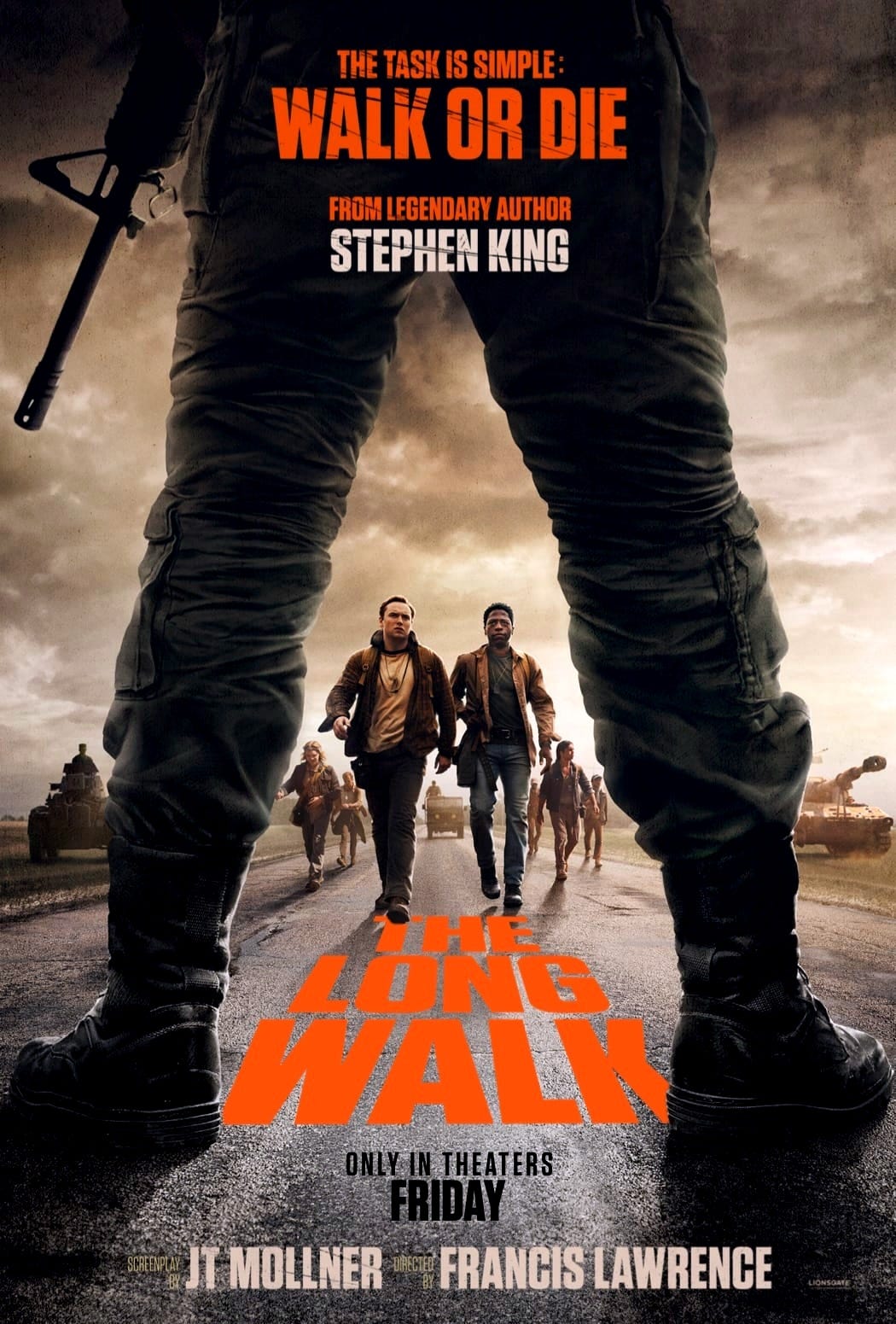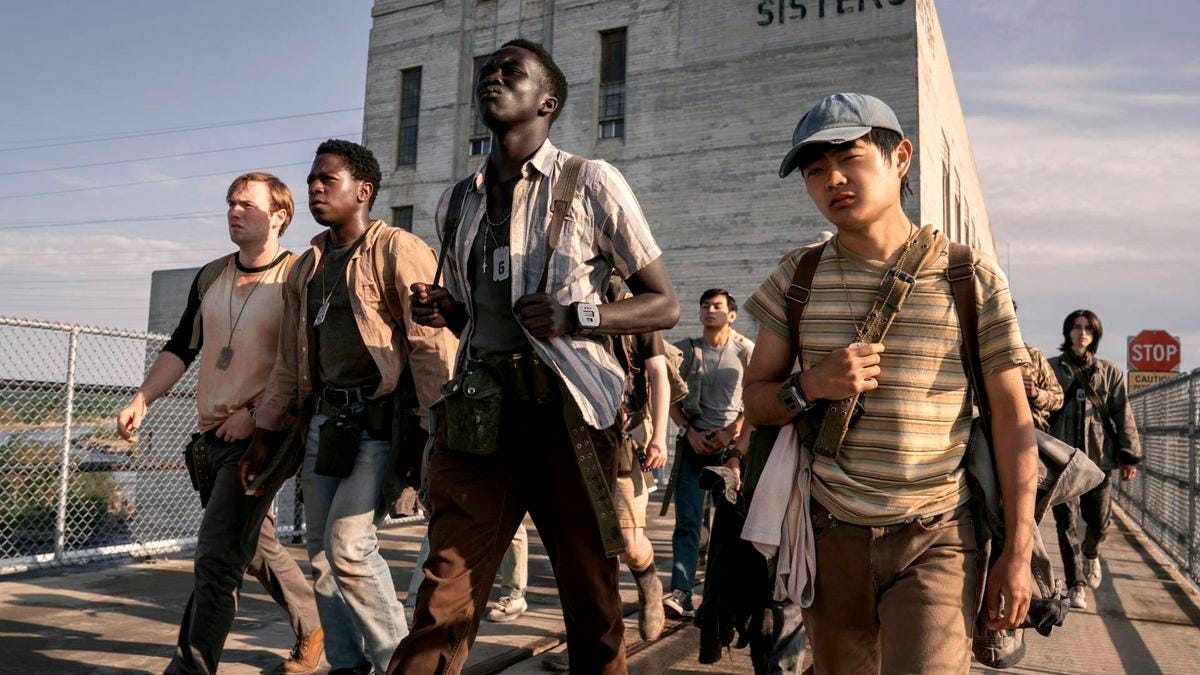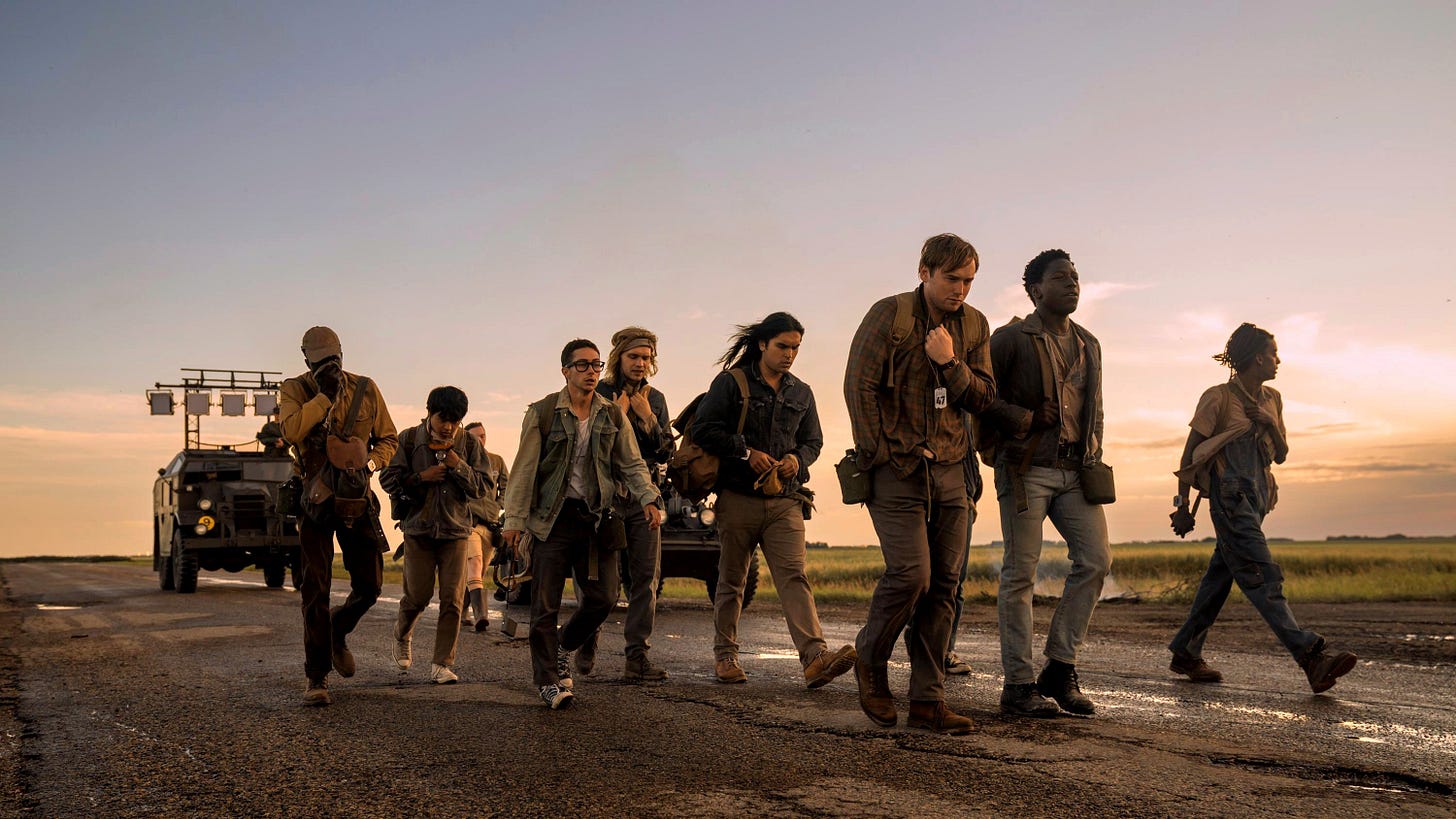Note: I will be discussing both the book and the film. As much as possible, I will stop short of proper revelatory spoilers for the latter, however avoiding them altogether is impossible. If you want to go in blind, I’ll understand. Bookmark this, go watch the film, then come back to me.
The Long Walk was the first novel Stephen King ever wrote, in the late 60s when he was a furious young man. That anger shows through in the prose at every turn. It’s far from perfect; King’s knack for dialogue was weak, and there are periods of histrionics and melodrama. But I read that shit when I was 12 and it burned deep into my psyche, remaining vitally important to me as I’ve aged. Lord of the Flies for Gen X slackers.
The pitch: in a dystopian future America, 100 teenage boys walk a gruelling non-stop marathon for the entertainment of the masses. Flanked by soldiers on halftracks, they must maintain a speed of four miles an hour. If they fall below that speed, they receive a warning. They must walk for an hour to lose a warning. If they receive three warnings and slow down one more time, they get their ticket… and are executed on the spot. Last one left gets The Prize: unlimited riches and one wish, whatever they want.
Although it was the first novel King wrote, it wasn’t published until 1978, under the pseudonym of Richard Bachman. Bachman’s voice has a harder edge than King’s own; aside from a couple of cute marketing gimmicks later on1, the Bachman novels are grim little potboilers about men who, rightly or wrongly, are angry at the world around them. Thinner is the only original Bachman book to display overt horror stylings; Rage, Roadwork, The Running Man and The Long Walk (collected together as The Bachman Books) all rely on sudden, unflinching violence to shock the reader.
Rage will never be filmed. It is the story of a hostage crisis in a school and was allowed to fall out of publication by King himself following a wave of school shootings, some directly linked to the book. Unsurprisingly, withdrawing one book from the shelves but leaving all the fucking assault rifles lying around for 20-odd years has not made any difference at all.
Roadwork could probably have worked if it came out in the 80s, maybe with Martin Sheen or William Hurt playing Barton Dawes, a furious loner staging a futile stand against the system. In 2025, while we’re all dried out husks thanks to the grim death throes of capitalism, they’d just pay old Bart off or burn his gaff to the ground. #WeAreAllBartonDawes
The Running Man has, of course, been filmed before - although the Arnie cheesefest really only shares a title and a couple of character names with its source. Edgar Wright’s attempt comes out in November and appears to cleave much more faithfully to the novel, however Glen Powell is no closer to the novel’s Ben Richards - a sickly, tormented wraith - than Schwarzenegger was.
The Long Walk has passed through many hands on its way to the screen. George A. Romero had the rights in the 80s; Frank Darabont was going to follow The Mist in the 2000s using the same crew and documentary filming style2 but never got around to it. Darabont’s rights lapsed, and a flurry of names tried to bring it to life. Finally screenwriter JT Mollner and director Francis Lawrence got it to the screen.
Having recently made the jump from our bog standard multiplex to the local Everyman, The Muse and I got invited to a members only preview five days before general release. Wild horses could not have held me back.
I used to be a stickler for faithful adaptations but the fact is that King’s tales do not always translate perfectly to the screen. For every Shawshank Redemption there will be a Misery3; sometimes you’ve got to take bold action. And Mollner certainly makes several brave changes to King’s novel in the name of effectively moving the story to the screen.
The field of contestants is down to 50 (one per state) with characters amalgamated in several places. This jarred me at first, but it makes perfect sense because 99 executions (even with so many happening in the background as in the book) in a 110 minute film would be too much for your average cinemagoer. The Walkers have been aged up slightly from the book because, again, Justin and Kelly don’t want to watch dozens of 16-year-olds get executed. The pace of The Walk is a more sedate three miles per hour, which allows you to better engage with these characters on screen.
The novel is clearly set in one potential future (there is mention of a 51st state), while Lawrence’s dystopia is deliberately timeless, a neverwhen, our only clue being that it is an America existing after a great war. Clothes, vehicles and tech are all dated and lo-fi, but the dialogue is modern and Mark Hamill’s snarling Major is a very obviously based on the demagogues of today; peddling messages that are clearly false, clearly against what most people are feeling, but are accepted as truth because the alternative is too horrifying to comprehend.
Not for the boys on the Walk, of course. They find out that the Walk is very real, very quickly. They quickly adopt a togetherness strategy to get through it.
There’s camaraderie in the novel, however the movie ramps it right up. King’s existential dialogue reflects the fact he wrote it during the Vietnam War; he may not have meant it to be allegorical but it certainly is. Meanwhile, Mollner’s script is more of a reflection on the modern, facile Western world. The dialogue is lighter, yet more revealing. There’s lots of talk about The Wish, about the unimaginable riches, about how winning means getting out from under, being set up for life. The four main characters, The Musketeers, have a touch of Stand By Me’s youthful optimism to them.
The Musketeers are perfectly cast. Cooper Hoffman brings an earthy realism to Ray Garraty, the homestate hero, while David Jonsson’s added years (comparative to his co-stars) mean he imbues McVries with a wisdom beyond the character’s years. Tut Nyuot’s Baker is a cheerful optimist right up until the very end; Ben Wang as Olsen is all piss and vinegar until the reality of his own situation hits home with gut wrenching force.
The book’s Walkers are fairly clear cut. Obvious nice guys, pitiful sad cases, big bold antagonists. The movie blurs these lines somewhat. There are fractious moments, but by and large they are all in it together. Charlie Plummer’s Barkovitch is a fascinatingly complex character, layers flaking away as the walk progresses. It’s an incredible performance in a supporting role. Garrett Wareing has a lot of fun as Stebbins, a character who is far more interesting in the film. Joshua Odjick gets my favourite character: the combative Collie Parker. He carries a palpable swagger but seems to have fallen victim of the edit a little - I feel like there was more Collie there originally.
And a brief moment for Judy Greer as Mrs Garraty. A thankless character to bring to life really, little more than a shrill worrier in the book, one of the best character actors of her generation whacks more emotion into three or four scenes than King did in the entire novel. I feel that Greer is severely underrated as an actress. Here, she is the onscreen personification of us, helplessly watching these guys walk themselves into the ground in their hopes of attaining the unobtainable.
Aside from nailing the characters, my greatest worry was that the movie would pull its punches. Francis Lawrence did youthful dystopia already on the Hunger Games, would he dial down the necessary violence, maybe even shoot for that dreaded PG-13? Happily, that is not the case.
The first few Walkers are dispatched with horrific, unflinching brutality. I knew exactly who was getting the first ticket and watching The Muse watch it play out was almost as entertaining as the events on screen. It’s a visceral suckerpunch for the unsuspecting. If you’ve read the book, go and see the film with someone who hasn’t - it’s a total blast.
Walkers are efficiently gunned down no matter what their circumstances. One kid is executed as he spasms helplessly in the middle of the road. Kids collapse unable to continue, and are then gone. The faceless soldiers are only there for one thing: issue those tickets no matter where the Walkers stand, sit, lay… or squat. Yes, the realities of walking non-stop are addressed on screen. When you’ve gotta go, you’ve gotta go - the question of whether you can take a shit with a gun to your head is answered here.
The relentless nature of the Walk is regularly hammered home. Warnings drone out monotonously as characters bicker; there is no escape. Walkers lose their shoes, still marching on in their bloodied socks. A mile counter pops up periodically, and as the count gets into double, then triple, figures, the Walkers’ gaits change, their faces growing haggard and old.
One scene from the novel - a midnight stomp up a viciously steep hill - becomes a nightmare set piece; warnings spat out all over the place, guns cracking in the dark, bodies falling, Walkers crying in terror. When the next morning dawns, the effects are painfully stark to see. This sort of stark reveal gives the film an emotional heft that I wasn’t expecting. Several tickets are heartbreaking to watch, even though they’re faithful to the book so I knew what to expect. The ending left me nearly breathless.
Not everything lands. The pacing seems a little off to me, frantically out of the gates then growing uneven as events progress. Maybe that was the intention, but I feel as though there was a hasty last minute edit to bring it in under two hours. At least one character is introduced then seems to die off camera. As with Collie Parker, a couple of Walkers get their moments but you feel like there was more to them in the original script. I suspect there’s a plus two hour edit out there somewhere which might sort the pacing out, as well as letting those characters breathe a little freer before they’re splattered all over the asphalt. Lastly, those changes that Mollner made to the source are sure to wind up a few Annie Wilkes-types4 who are wedded to the novel.
I had to sleep on it to let my thoughts coalesce, but I think this will be recognised as one of the better King adaptations. It manages the extremely difficult balancing act of being faithful while adding its own unique touches. The main story beats make it through okay, and the action is suitably horrific to carry The Big Man’s name. As with all the best King adaptations though, it is the character and heart that shines through the most.
It may not stand shoulder-to-shoulder with Carrie5 or The Green Mile, but it’s better than Salem’s Lot, any of the Pet Sematarys, and all of the Children of the Corn put together. How many Children of the Corn are there? Eleven to date. Eleven shit films spun out of one 50-odd page short story. Get a fucking grip, people. Be more like Francis Lawrence and JT Mollner.
Thanks for reading. My ego is massive but fragile, so show some love before you scarper. Bang that like button on your way out, or get involved in the comments if this piece landed well with you. If you’re feeling really flush, buy me a beer and I’ll love you forever. Cheers.
The Regulators and Blaze were both published long after Bachman died of ‘cancer of the pseudonym’ in 1985, and both sound, to me at least, much more like The Big Man himself.
I would’ve loved to have seen this version. It is one of my great lost movies.
William Goldman’s Which Lie Did I Tell? is a must read if you’re interested in bringing a screenplay to life. It is relevant here because it details the ding dong Goldman had with Rob Reiner over adapting some of Misery’s more violent scenes.
As portrayed to great effect by Kathy Bates, Annie is an obsessive fan. Fun fact: she’s a metaphor for substance abuse - King was still in the grips of addiction when he wrote Misery.
De Palma’s ‘76 version, obviously. Do not come at me with any of the others until Mike Flanagan does his TV adaptation.






this is a fantastic review, i very much respect your restraint in keeping it pretty much spoiler-free! i think you are probably spot on about some characters getting slimmed in the edit to the slight detriment of the movie. that being said, i would love to hear your thoughts on the ending...
Solid piece, and an admirable job you did of not offering anything spoilerish (as far as I'm concerned). I hesitated before reading it b/c I'd like to see it, and now I want to see it even more. Also really enjoyed all the other Stephen King insight and film adaptation stuff - I learnt quite a bit here.